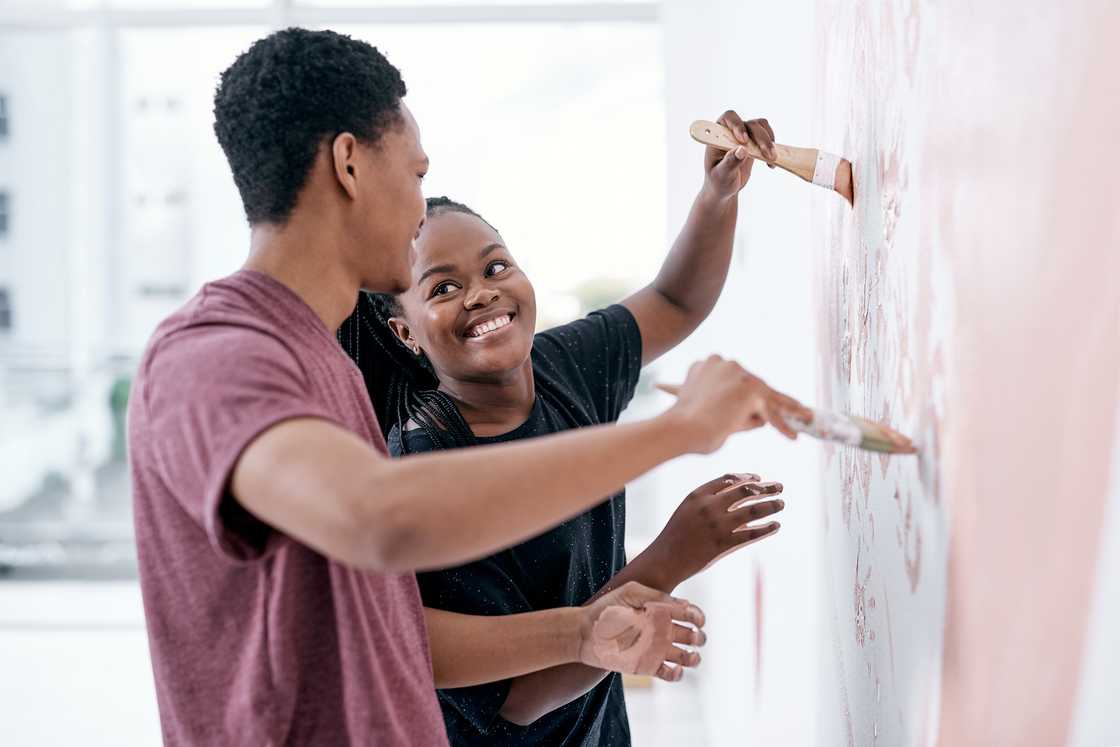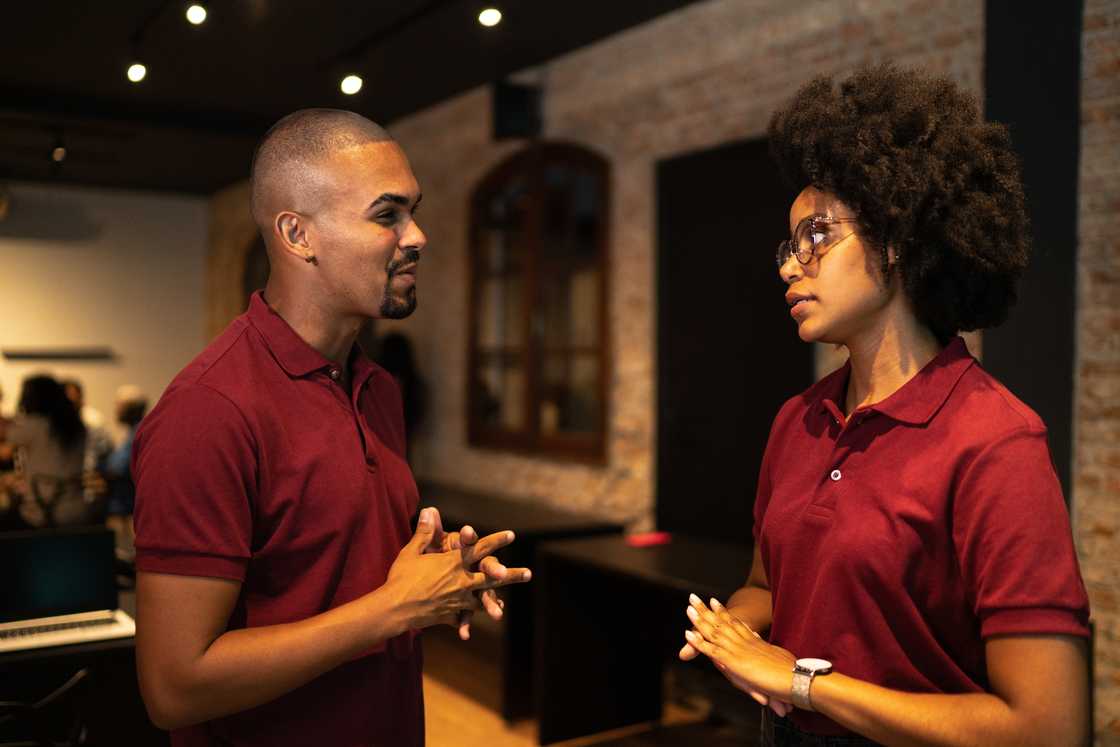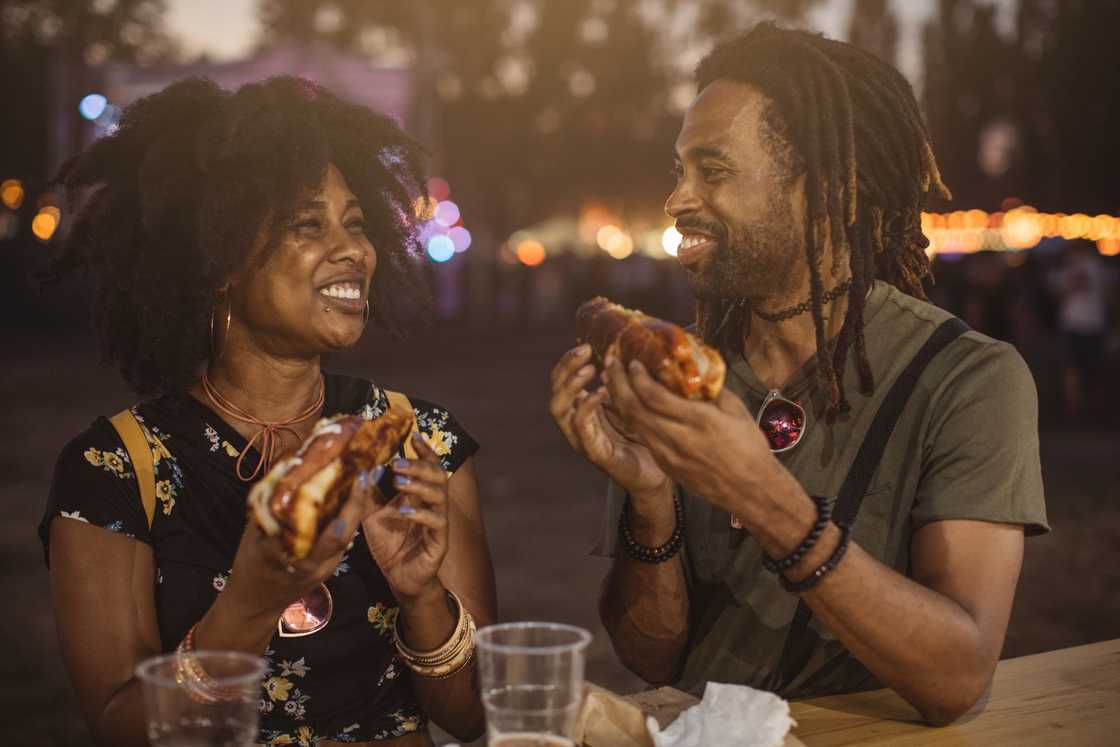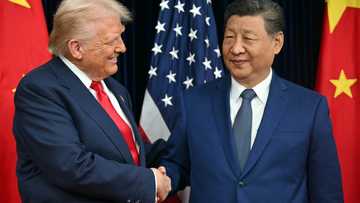He repeated the word, as if it were holy. “We.” “We need to talk.” “We will move.” “We can’t afford that.” Each sentence started with that single word, but ended with his decision. By the time I realised how small I had become inside that “we”, it was already too late.

Source: Getty Images
We were standing in our living room in Ikeja, sunlight spilling through half-drawn curtains, dust floating in quiet motion. My suitcase sat by the door. His voice was calm, but it was the kind of calm that hides fire.
“So this is it?” he asked. “After everything we’ve built?”
I swallowed hard. “Yes.”
He let out a small, almost disbelieving laugh. “You think peace is out there? It’s right here if you just stop fighting me.”
But it wasn’t peace. It was quietness pressed over my mouth.
For months, I had tried to make our life fit both of us, but it kept shrinking around his ambitions. Every time I spoke of mine, he said, “We don’t need that right now.”
When the job offer came from Abuja, I knew what his answer would be before I asked.
“You can’t take it,” he said. “We agreed not to live apart.”

Source: Getty Images
He meant, I decided.
That morning, I packed slowly. My hands trembled as I folded each shirt. My husband watched me, disbelief flickering in his eyes.
“You’re really choosing yourself?” he asked, almost amused.
I looked at him and said, “Yes. For once, I am.”
There was silence. Then something unexpected.
He didn’t shout. He didn’t beg. He said, “You’ll come back.”
But he was wrong. Because that day, when I closed the door behind me, I walked into a different kind of peace, the kind that begins quietly when a woman finally remembers her own name.
When I first met Kola, he was magnetic. The kind of man who made every room hum a little louder when he spoke. I met him at a creative marketing seminar in Yaba. He wore confidence like a tailored suit, every gesture deliberate, every word sharpened.

Source: Getty Images
He spotted me during a breakout session and said, “You ask questions like someone who wants to change the world.”
I blushed, laughed, and thought, Maybe I do.
We began as friends. We stayed up late sharing ideas, building imaginary campaigns, and dreaming of a future where we would own our own agency. It felt like destiny.
When we got married, it was a small ceremony in my parents’ compound in Surulere. It had soft music, too many selfies, and friends who believed we were unstoppable. Everyone said, “You two are perfect together.”
And for a while, it felt true.
We rented a small apartment, one of those starter flats where everything echoed. We painted the walls ourselves, ate noodles on the floor, and laughed at how broke we were. We were a team, or so I thought.

Source: Getty Images
Then subtle things began to shift.
He started correcting me in public. “Don’t say it like that,” he’d whisper. “We sound unprofessional.”
He monitored what I wore. “You don’t need lipstick for client meetings. Keep it simple.”
I took it as care. I told myself, Kola wants me to look my best.
When his marketing agency began to grow, I was proud of him. I designed the logo, wrote the first proposal, and helped secure the first three clients. But each contract bore only his name.
He called me his “backbone,” a word that sounded like praise but felt like invisibility.
I began to fade behind him.
When I tried to launch my own consultancy, he said, “Why divide our energy? Let’s focus on one goal. Our goal.”
That word again. Our.
So I folded my dreams neatly, telling myself I could always unpack them later.

Source: Getty Images
Years passed. I became the silent co-founder, managing accounts and writing reports while he pitched and posed for photos in newspapers. He was the face, I was the ghost.
When the NGO invitation came — a six-month project empowering women entrepreneurs in Abuja — it felt like the universe whispering, “Wake up.”
It was a chance to do meaningful work, to reclaim something I had lost. But when I showed Kola the email, his face darkened.
“You can’t take it,” he said. “We need you here.”
That night, I lay beside him, staring at the ceiling, realising how small my world had become.
And in that quiet darkness, I knew something was about to break.
The tension arrived before the fight.
Kola started giving me the silent treatment. He moved through the apartment as if I were background noise. When I brought up the offer, he changed the subject.

Source: Getty Images
One night, he said, “You’re not thinking straight. We’re building something big here. You’ll mess it up if you leave now.”
“I’ll only be gone six months,” I said softly.
“Six months without me is too long.”
It wasn’t love in his tone. It was ownership.
The next morning, he sent an email to a client and copied me in. The signature read, Kola and Associates. My name had disappeared from the footer.
I confronted him. “What happened to ‘Kola and Adaeze Consults’?”
He smiled faintly. “It’s just branding. People trust one voice more than two.”
I felt heat rise in my chest. “Whose voice, exactly?”
He didn’t answer.
Days turned into weeks. My excitement for the job dulled under his disapproval. When I tried to discuss logistics, he dismissed me. “We can’t afford this experiment.”
I realised then that every “we” meant “you can’t.”

Source: Getty Images
The fight came on a Sunday. My former professor had invited me to a small alumni networking brunch. When I told him, he frowned.
“We have errands.”
“I’ll only be gone three hours.”
He folded his arms. “You keep making decisions like you’re single.”
Something inside me snapped. “Maybe I am.”
The silence that followed was electric. Kola stared at me for a long time, then said, “So that’s where we are now?”
I didn’t answer.
Later that night, I slept on the couch. He didn’t come to check.
The next day, I received a call from Mrs Johnson, my old mentor. “My dear, about the Abuja role, have you decided?”
I hesitated.
Kola walked into the room mid-call. “Tell her you’re not going,” he said flatly.
I turned away from him. “I’m still thinking, ma.”

Source: Getty Images
After I ended the call, he shouted. “Are you trying to embarrass me? Do you want people to think I can’t take care of you?”
“I just want a chance to grow.”
“You can grow here. With me. Everything we have is ours.”
“But it’s never mine, Kola. Not even my thoughts.”
He looked stunned, then angry. “You’re being ungrateful.”
That night, I couldn’t sleep. I sat by the window until sunrise, watching Lagos slowly come to life. Horns, hawkers, the smell of early rain. The world kept moving while I stayed frozen.
At dawn, I packed a small bag.
He woke up and watched me quietly. “You’ll regret this,” he said.
I looked at him, tears in my eyes. “Maybe. But regret is better than resentment.”
Then I walked out.
Moving to Abuja felt like stepping into my own skin again.
The first night, I barely unpacked. I lay on the mattress, staring at the ceiling fan, breathing air that didn’t ask for permission.

Source: Getty Images
The next morning, I opened my curtains and let sunlight flood the room. I brewed coffee, played Asa softly, and whispered, “Good morning, Adaeze,” just to hear my own name again.
At work, the project team was diverse and vibrant. I led workshops, met rural women starting small businesses, and saw my ideas bloom into something actual. Each day reminded me that I was capable.
Then came Chike.
He was quiet, thoughtful, and had the kind of smile that carried calm instead of chaos. We worked together on logistics for one of the outreach events. He always listened when I spoke, something I had forgotten how to receive.
One evening, after a long field trip, we stopped by a small roadside suya spot. The air was warm, the night buzzing with music. He said, “You know, when you talk about your work, your eyes light up.”
I smiled shyly. “It’s been a long time since anyone noticed.”

Source: Getty Images
He looked at me for a moment. “Then let them notice again. Just don’t dim it yourself.”
I didn’t fall in love with Chike. What I felt was gentleness, the kind I hadn’t known could exist between a man and a woman without possession.
He became a mirror. Through him, I saw what I could be without fear.
When Kola called a month later, his tone was oddly calm. “How’s Abuja treating you?”
“Peacefully,” I said.
He chuckled. “You think peace lasts forever? You’ll get tired.”
I looked around my flat. Books stacked neatly, flowers by the window, my laptop glowing with work I loved.
“I hope you’re right,” I said. “Because I plan to stay tired of chaos.”
He sighed. “I miss us.”
“I miss who we were supposed to be,” I replied.
The call ended quietly, like closing a chapter without bitterness.

Source: Getty Images
By the time the project ended, I had grown into someone unrecognisable from my old self.
I rented a bigger apartment in Garki. The walls were cream, the floors tiled, and the light poured in through sheer curtains every morning. It became my safe space: quiet, warm, mine.
I started freelancing, helping small businesses tell their stories. For the first time, I chose my clients, my schedule, my voice.
I also began volunteering with a mentorship initiative for young women. I saw versions of myself in them: brilliant, eager, and sometimes too quick to apologise.
When one mentee said, “My boyfriend doesn’t like me travelling alone,” I told her gently, “Be kind to him, but kinder to yourself. A partnership that fears your wings will never protect your roots.”
She smiled, and I knew I was finally practising what I preached.

Source: Getty Images
Months later, I received an email from Mrs Johnson. She wrote, Your courage inspired our next mentorship theme: The Power of Choice.
That message became my small badge of honour.
Kola sent a text one evening. “Saw your article in the paper. Proud of you.”
It didn’t sting. It didn’t soothe either. It just landed softly.
We didn’t need closure anymore. The distance between us was its own peace.
As for Chike, he constantly remained in my life. We talked about books, life, and purpose. He once said, “You know, you don’t owe anyone smallness.”
I smiled. “I know.”
A year later, I received an invitation to speak at an alumni coffee meet at a café in Maitama. I covered storytelling, but what I really shared was rebirth: the art of remembering your own voice.

Source: Getty Images
After the session, a man approached me. He said, “I liked what you said about choosing peace. It takes courage.”
We talked briefly and exchanged contacts.
I didn’t feel butterflies. I felt calm. That, I realised, was the difference between fear and freedom.
That night, as I wrote in my journal, I smiled and wrote, “peace is not a gift you receive. It is the choice you protect every day.”
Looking back, I understand that love is not about merging; It is about walking side by side, each carrying your own light.
For years, I believed that devotion meant disappearance. That if I sacrificed enough, the relationship would thrive. But what thrives in silence is not love. It is control.
Choosing myself was the hardest decision I have ever made, and the kindest. It did not make me selfish. It made me whole.

Source: Getty Images
People often say relationships crumble when women start thinking for themselves. But thinking is not rebellion. It is survival.
Now, when I see couples on social media posting captions like “We do everything together,” I smile and hope they remember that unity without individuality is just dependence with good lighting.
A true “we” must begin with two complete “me’s.” Anything less will collapse under the weight of expectation.
Kola taught me the cost of losing myself. Chike reminded me what respect feels like. But peace, peace came from finally listening to the small voice inside that said, You are enough as you are.
So I ask you, reader, when was the last time you chose yourself, not because you stopped loving someone, but because you finally started loving yourself too?
Because sometimes, the most radical act of love is simply this: to stay loyal to your own becoming.
And when you do, peace follows. Not as thunder, not as applause, but as a quiet knowing that you have finally come home to yourself.
This story is inspired by the real experiences of our readers. We believe that every story carries a lesson that can bring light to others. To protect everyone’s privacy, our editors may change names, locations, and certain details while keeping the heart of the story true. Images are for illustration only. If you’d like to share your own experience, please contact us via email.
Source: YEN.com.gh
Source: Yen.com.gh






















